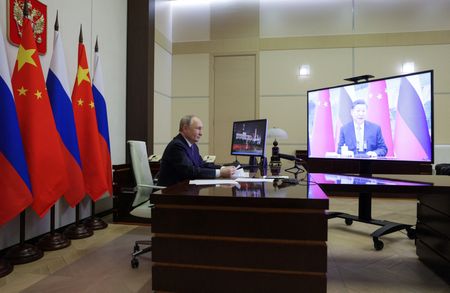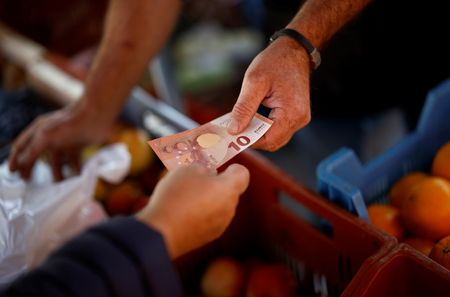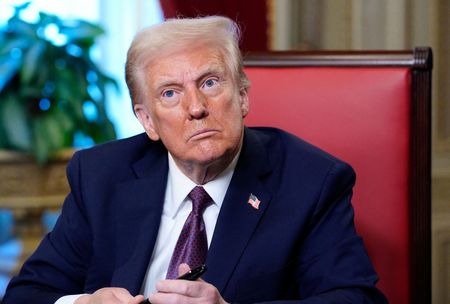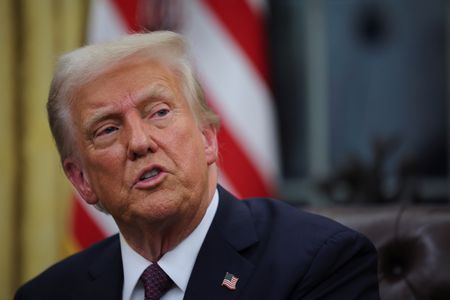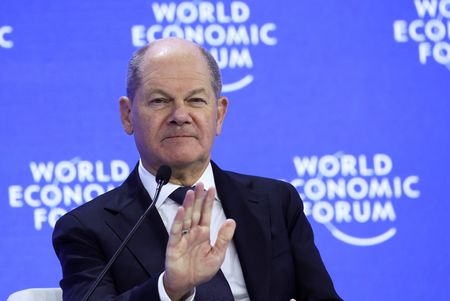By Dmitry Antonov, Guy Faulconbridge and Liz Lee
MOSCOW/BEIJING (Reuters) -Russian President Vladimir Putin and Chinese President Xi Jinping discussed on Tuesday how to build ties with Donald Trump, prospects for a peace deal to end the war in Ukraine and Moscow’s firm support for Beijing’s position on Taiwan.
Xi and Putin, who spoke for an hour and 35 minutes by video call after Trump was sworn in as U.S. president, proposed a further deepening of the strategic partnership between their countries which worries the West.
China and Russia declared a “no limits” partnership in February 2022 when Putin visited Beijing, days before he sent tens of thousands of troops into Ukraine. Putin has in recent months described China as an “ally”.
Putin, 72, speaking from his Novo-Ogarevo residency outside Moscow and Xi, 71, speaking from the Great Hall of the People in Beijing, called each other “dear friends”, and Xi told Putin about a call with Trump on Friday on TikTok, trade and Taiwan.
Xi and Putin “have indicated a willingness to build relations with the United States on a mutually beneficial, mutually respectful basis, if the Trump team really shows interest in this,” Kremlin foreign policy aide Yuri Ushakov told reporters in Moscow. “It was also noted from our side that we are ready for dialogue with the new U.S. administration on the Ukrainian conflict.”
Ushakov said Putin wanted long-term peace in Ukraine, not a short-term ceasefire, but any deal must take into account Russia’s interests. No specific proposals for a call with Trump have been received, he said.
Trump has said he will be tough on China and speak to Putin about ending the war in Ukraine. In remarks to reporters after his inauguration, Trump said Putin should make a deal to end the war because the conflict was destroying Russia.
Russia and China have increasingly found common geopolitical cause. Xi has called for talks to end the war in Ukraine and has accused the U.S. of stoking the war with weapons supplies to Kyiv, which also says it is ready to seek a negotiated solution that respects its interests.
WORLD VIEW
Trump told The Wall Street Journal in October that Xi was “a good poker player” and that he got along “great” with Putin, but that during his first term he had warned Putin that the U.S. could strike Moscow if Russia went further in Ukraine.
Putin and Xi share a broad world view, which portrays the West as decadent and in decline as China challenges U.S. supremacy in many areas.
“We jointly advocate building a more just multi-polar world order, and we are working in the interests of ensuring indivisible security in the Eurasian space and in the world as a whole,” Putin said.
Ushakov said the Putin-Xi video call had been planned before Trump’s inauguration.
The U.S. casts China as its biggest competitor and Russia as its biggest nation-state threat. Former U.S. President Joe Biden said the world’s democracies face a challenge from “autocracies” such as China and Russia.
China is the largest consumer of Russian energy, and the biggest single oil export market for Russia, Putin said, adding that they would push ahead with cooperation on cooperating on fast neutron reactors and reprocessing nuclear fuel.
On Taiwan, Ushakov said Russia had “confirmed its unwavering position of support for the one-China principle.”
Xi said in a New Year’s speech that no one could stop China’s “reunification” with Taiwan, a clear warning to what Beijing regards as pro-independence forces within and outside of the island of 23 million people.
China regards democratically governed Taiwan as its own territory. Taiwan’s government rejects Beijing’s claims and says only its people can decide their future and Beijing ought to respect the choice of the Taiwanese people.
(Reporting by Reuters; Writing by Guy Faulconbridge and Anastasia Teterevleva; editing by Andrew Osborn, Raju Gopalakrishnan and Timothy Heritage)

